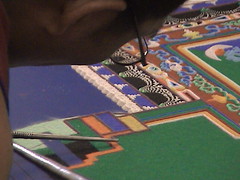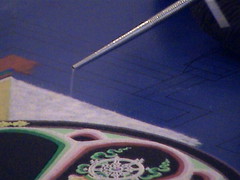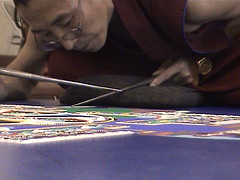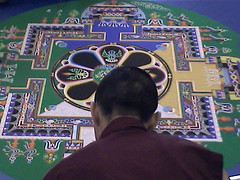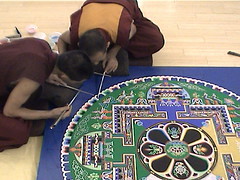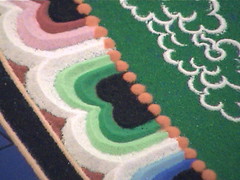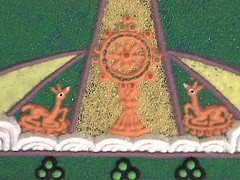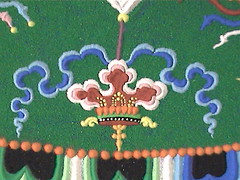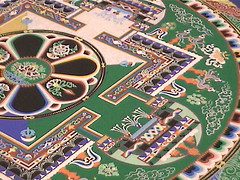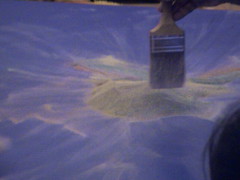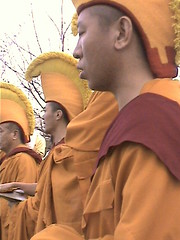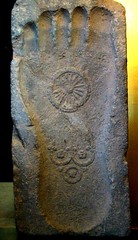
I thought I would begin with my own initial experiences of "religion" and insight. I don't feel that I, growing up in the West, have ever adopted an "Eastern" viewpoint. There is a beauty to Eastern culture, running quite contrary to Western culture, that can grip someone who has lost faith in the materialist, reason-based, Western ideals. This sort of effect does not typically occur as a child but in adulthood.
SOCIALIZATION
The "Western" viewpoint takes root in childhood, as each child is taught a way to conceptualize their everyday experiences. Each individual child takes in an experience and compares it to their developing worldview. As far back as I can remember, I found that these two ideas rarely agreed. My individual experience of events did not agree with the socialization ideology of my region. There seemed to be another side of all things which no child or adult around me could see, almost like seeing an apparition that was invisible to all others.
I can remember as I progressed through early schooling, year to another, the children around me adopted new views, mannerism, thoughts, habits, and ideas. While there were small differences, the general structure of these changes was apparent. The gradual absorption of these habits, rituals, and mannerism did not seem to "download" and "start running" in me so well. Something within me seemed to be broken.
Facial expressions, hand gestures, ways of walking and talking, sounds, words, vocabulary... they all failed to work so well with me. It was as if my "Operating System" did not recognize these strange programs. I spent a great portion of my childhood trying to figure out what was broken and learn how to fix it as quickly as possible. I wanted to adapt to this environment and adapt these mannerism and learn how to coincide with those around me. Instead, the human experience, at all times, felt almost false.
I made attempts to understand this problem and I asked those around me if they had similar experiences or observations. I can still remember from very early childhood a particular girl's response to my inquiry:
"What the hell is wrong with you?"
DONKEY AND THE CARROT
At around this same time I began to notice that things that others derived a sense of pleasure from did not bring about that same effect in me, or at least on the same apparent scale. I also began to feel like life was some little trick, like a donkey following a carrot held out in front of him with a stick... a carrot he will never reach, but keeps walking nonetheless. When someone in class would offer me a piece of candy, I would eat it, and leave the experience worse off. At that moment, the candy had brought about a craving for candy which could not be satisfied by one piece. The horror of it all was that when I would attempt to satisfy this craving by purchasing a treasure room full of candy and walking down the candy-buffet, I also found myself worse off. I would eat too much candy and feel sick, tired, and get a headache. Was there no solution? Was there no middle ground?
I also had the same observance with sleep. I either had way too much, or more often, very little. I was later diagnosed with a sleep cycle disorder, a disorder in which my brain is constantly on, and when I reach deep stages of sleep, my mind is ripped from it with thought, and therefore true rest is unattainable. I was told that 8 hours of sleep for me was equivalent to only about 4 or 5 for someone else. Basically I lack restful sleep and so I never find that perfect balance and attain a "perfect night of sleep" where I awake refreshed.
I began to feel that there was a hidden taint to all things pleasurable and that happiness was an impossibility.
FORM
Another event which sticks out in my mind was when a person from another country looked at a river and called it a stream. I corrected them and told them it was a river, but then wondered how I knew so. I begin to try to find the point where a river ends. At what size, depth, width, or rate of flow does a stream end and a river begin? Can there be such a place? There was no actual point of change so how could I know one from the other?
This moment shook me and everything in the world lost much of it's form. Did anything exist? I couldn't even prove to myself that a river existed!
I found some relief when I looked at my own body. There I found a shell, in the form of skin and it was easy to say what was my body and what was someone else's body. But I made the mistake of listening during biology class. I found out that cells constantly die and new cells are formed. The food we eat becomes muscle, sinew, bone, hair, and perhaps even fuels an individual thought. I am food, I realized... but I am also not food. I was something else. Where was I? I started to feel like the river.
What connected the
me of now with the
me of then? If every cell in the human body has been replaced within 7 years, what part of me is me? My thoughts? Even those change!
Another vivid memory is looking in the mirror as a child and feeling no connection to the face. The sight perception has not thought of, "I am looking at myself." It was a face but I had the experience as if I was looking at a picture of someone else's face. It didn't belong. I also had a similar experience with my name. I had a daydream in which I was outside of the vessel in which my name held firm and had no grasp of how it had been assigned to me, what it was, and where it was. It was as if the concept of
NAME short-circuited.
Things really became confusing when a new experience began. I was in the middle of speaking with someone when I lost the anchor with myself and began to drift from that state of mind. For a moment, I could sense and feel the micro-calculations that went into every word and within every sentence, and how each word was meant not only to express an idea, but to establish a concept of
ME within that person's mind, but in the manner that I wanted it to be so. I could see that all human conversation, in my mind, had a hidden agenda. But with that sub-process stopped, there was no source of words and the conversation stopped in mid-sentence. From there I went out of normal experience and began to lose the concept of subject and object, of the normal flow of time, and there was a silence in my mind that was, for the first time, deafening. The hundreds of tiny thoughts were gone. Everything that
IS, was not
IS anymore. I had a sense that I needed to pull out further.
Now I would define it as if I were still in a defiled state and had to unattach further. With that came a sense of longing for the sensual, defiled, unhappy world. The world made no sense, people made no sense, but that was where I wanted to be, and I wanted to experience that world with the tiny sufferings of each moment. The experience faded.
Those moments were to occur and still do occur, but each time that hold I have on pulling myself back gets weaker. The desire to return to "
this" is less.
With not one soul around me to speak of these things, I began to look to mentors or guides within religion. I found no answer. Those held in regard within the church that I was brought to by my parents seemed as lost as I was. The worst thought was that I felt that they didn't sense this other shore and had no desire to get there. They seemed attached to their words in the way that I was, in establishing myself within someone else, and dispensing my own agenda.
THE EAST
Asian Philosophy and Asian viewpoints had always made more sense. There was not the same sense of "foreign" in their worldview/experience as there was where I lived. Yet even this worldview failed to address many experiences that I felt ran contrary to the way it was stated that "
things were."
In college I began to be fascinated by Buddhism. It was interesting that in all my childhood reading of Asian culture, philosophy, and art that I had never had the thought to read a book specifically on an Asian religion. Much of it had to do with a belief planted in my mind that other religions were impure and that it was a sin to embrace them. Though I doubted that this was correct, it somehow diverted my attention.
After reading the words of the Buddha and learning of Buddhist philosophy, I begin to finally feel that I had mentors in this world. Here is someone who had been through similar experiences and doubted the validity of the current worldview of reality. I had the same experience with
Daoism and later
Hinduism. After some time I began to read Buddhist works more and more. I did not define myself as Buddhist, but said that "we appear to be walking the same path."
Much of this, I think, was driven by ego. The revelations that Buddha made to many people, that shocked people, and woke them from their waking dream, was nothing new to me. The satisfaction I had was in the way the Buddha and others could express this experience, far beyond any way that I had attempted.
One thing had to be clear to myself and to others: I had discovered these things for myself.
THE TWISTING PATH
It is hard to predict where a path will lead. This ignorance and holding to ego held me into Buddhism long enough to learn deeper aspects of this reality and to further my experience. Instead of feeling like the sun within this galaxy, large and grand, I began to feel like one grain of sand on the
River Ganges. I was humbled by thoughts and experience far beyond anything I had ever experienced and realized that "I am nothing special."
Since that time, many beliefs have had an effect on me and brought about change, but Buddhism has been the deepest river for me. I stopped trying to prove myself and prove to people that I wasn't some "Westerner turned
yogi." I just wanted to learn and progress. It was no longer an insult to ego to call myself a Buddhist.
INDIVIDUAL EXPERIENCE
Lately, I haven't been so attached to these names and labels. Enlightened experience is individual. Since childhood I have felt that people should take individual responsibility for their education, both spiritual and material. Those that have come before and have awakened did so in a state outside of the convenient sections of the bookstore or with any silly names. Each individual constructed their worldview through individual experience and therefore the means to transcend ignorance will be individual and unique. The one true source for one might not be so for another. Others may need no religion at all.
(a topic in the works for a future posting)My bookshelf holds more books on Buddhism, mainly
Tibetan and
Chan, but it also holds works of many faiths and religions. That is the easiest way to describe my path,
my jñana-marga.
I once finished yoga and began to meditate. A thought entered my mind, "Am I practicing Hindu meditation or Buddhist meditation. The ignorance of this concept, of the name defining the method, opened me up even further to this idea of individual experience. As the Buddha said, "
Be lamps unto yourself."
